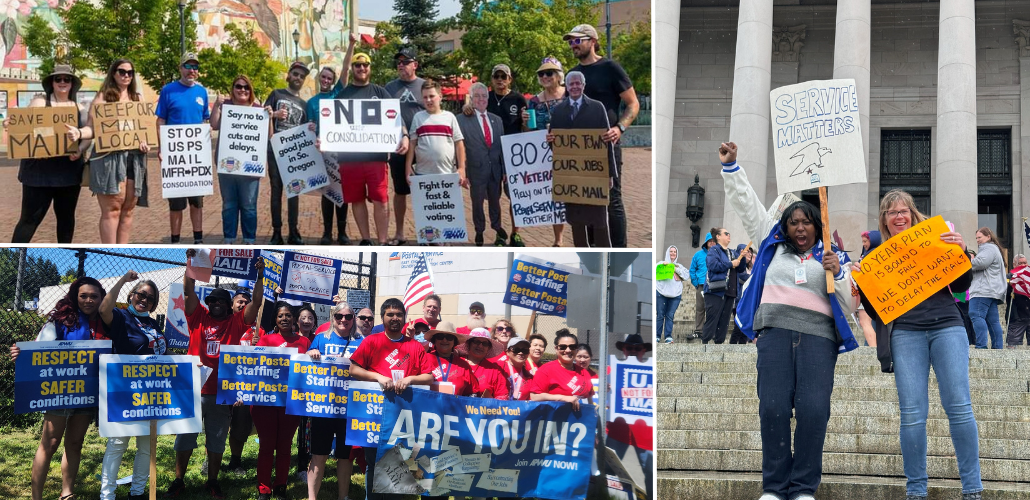October 1: Nationwide Rallies to Save the Postal Service

Left: Postal workers and supporters rallied this year in Medford, Oregon, and Redmond, Washington. Right: Seattle postal delivery driver Miriam Brockman and Spokane postal worker/We Won't Be Silenced co-founder Sheri Butler at the state capitol in Olympia. Photos: courtesy of Miriam Brockman
The Postal Workers (APWU) will hold a national day of action on October 1, with rallies all across the country for better staffing and better service, a better contract that ends the two-tier wage system, and the right to speak to the board that governs the postal service.
Postmaster General Louis DeJoy’s plan to “modernize” the Postal Service consists of condensing it. In the name of saving money, he is pushing to consolidate mail processing plants into fewer, bigger, more automated ones—which means cutting hundreds of jobs each time and slowing down the mail, especially for rural customers.
The state of Wyoming will have no mail plants left at all, so if you mail a letter across town in Cheyenne, it will have to travel all the way to Denver and back.
Already the mail has been slowed considerably. My cohorts and I have been doing mail testing—sending mail from all across the country to see how long it takes to arrive. The first piece of mail I got took more than two weeks.
DeJoy is also cutting post office hours, raising postage prices, and understaffing. Customers get frustrated with long lines and delivery delays—when it becomes a bother to go to the post office, they turn to competitors like Amazon, FedEx, and UPS instead. The end goal appears to be breaking up the public Postal Service for private monopolization.
Instead of cutting it back, we should be growing the People’s Post Office. If you want a business to grow and succeed, you invest in it. A law passed in 2022, the Postal Reform Act, allows USPS to explore working with state, local, and tribal governments to generate new revenue by adding innovative new services.
You can already visit your local post office to take care of your passport or buy a money order. Imagine you could also do your banking, set up TSA PreCheck and CLEAR, and get fishing and hunting licenses—and appropriate staffing levels to make all these services convenient to use. Imagine a service where you could have a letter carrier place a video call so you could check in on a loved one who lives far from you.
PUBLIC COMMENTS SILENCED
Postal workers started the “We Won’t Be Silenced” campaign last year when the Postal Board of Governors started limiting the public comment period at its quarterly meetings.
The Postal Board of Governors is the agency’s top body, the people who approve these large-scale plans—and who could fire DeJoy. For years the public was given time to speak at the end of their meeting, either in person or by teleconference, typically for three minutes per person.

SUPPORT LABOR NOTES
BECOME A MONTHLY DONOR
Give $10 a month or more and get our "Fight the Boss, Build the Union" T-shirt.
Then the board stopped allowing public comment online; only those present in person could speak. Most postal workers and customers can’t afford to fly to D.C. every three months for a brief opportunity to speak to the impacts of these major changes they are making to our postal service.
It got worse at the August 2023 meeting, when they cut down the public comments to just 25 seconds per person. APWU member Sheri Butler, who had traveled all the way from Spokane, Washington, said this didn’t even allow her time to introduce herself as a postal worker—only to make one tagline statement.
At the next four quarterly meetings, there was no time given for public comment at all. It appears that DeJoy and the Board of Governors don’t want to hear from the public.
Meanwhile, Butler came home and, along with Philadelphia APWU President James DeRidder and others, helped start We Won’t Be Silenced. Members organized protest rallies around the country in February and May. At its convention this summer, the APWU voted to support the campaign with the upcoming day of action.
MEDS DELAYED
In May, under pressure from senators and the national unions as well as our grassroots protests, DeJoy said he was pausing his consolidation plan until 2025. But he never clarified exactly what was being paused. Postal workers still saw machinery being moved out of their plants.
In a public Zoom call on September 5, management presented a map showing how its plan will slow pickup and delivery in rural areas, while supposedly speeding it up in some urban hubs. Their math was so convoluted, it left more questions than answers—they acknowledged that delaying the mail is illegal, then described their plans to delay the mail.
That’s going to hit especially hard for veterans, seniors, and people with mobility issues in rural areas who rely on mail delivery of medicines. My dad, for instance, who lives in a small town in Kansas, gets his blood pressure meds by mail; recently they took almost a month to arrive.
Tell your friends and family members about the October 1 rallies. Visit apwu.org/day-of-action to find one near you.
Miriam Brockman is a postal delivery driver in Seattle and a graduate of the APWU’s inaugural Leadership Institute class.



